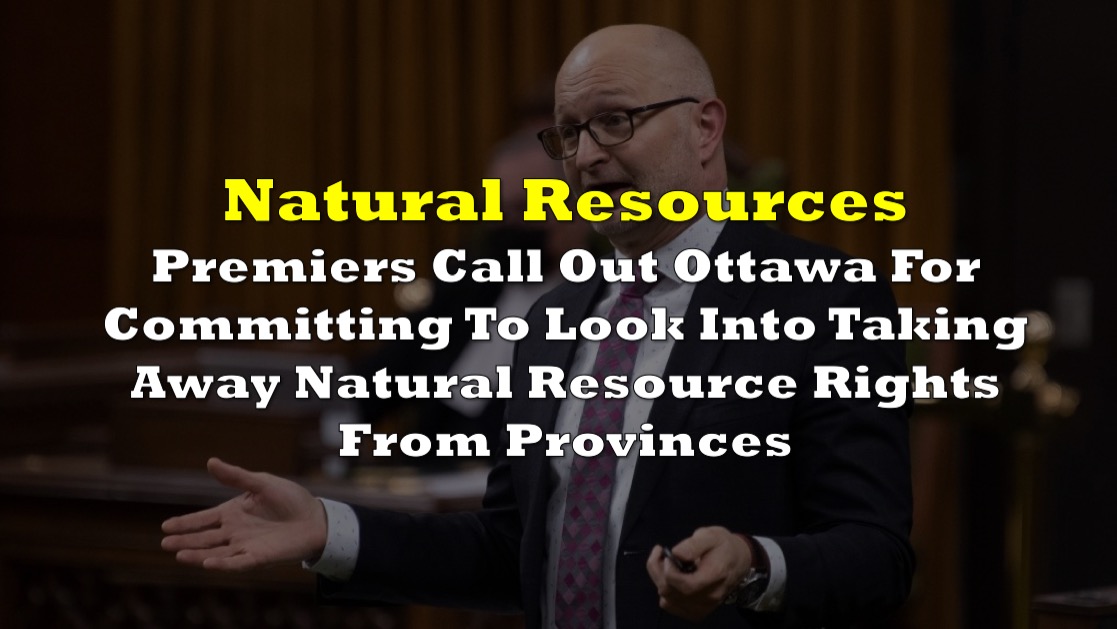Premiers from Alberta and Saskatchewan have both made their objections clear after Canada’s Attorney General and Justice Minister David Lametti committed to “looking at” rescinding Natural Resources Transfer Agreements to the provinces.
“I obviously can’t pronounce on that right now but I do commit to looking at that,” Lametti said at the Assembly of First Nations Special Chiefs Assembly last week. “It won’t be uncontroversial, is the only thing I would say, with a bit of a smile.”
The comments caused an online uproar, with Lametti immediately issuing a statement clarifying that “at no point did [he] commit [the] government to reviewing areas of provincial jurisdiction, including that over natural resources.”
NEP 2.0 pic.twitter.com/EH3duYgan8
— Carin Danley (@nimmity_anna) April 11, 2023
However, this did not stop Saskatchewan Premier Scott Moe and Alberta Premier Danielle Smith from putting their objections on record.
“This is an outrageous and ill-informed comment, as those agreements and the provinces’ control over natural resources have been entrenched in the Canadian constitution since 1930,” Moe said in a statement.
The federal Justice Minister says he will look at taking control over natural resources away from the provinces.
— Scott Moe (@PremierScottMoe) April 10, 2023
It's an outrageous statement.
Read my response below. pic.twitter.com/igXS1vAg9I
Smith echoed the sentiment, saying that the proposed move “would pose an unprecedented risk to national unity and Alberta condemns this federal threat in the strongest possible terms.”
“I will be contacting Premiers Scott Moe and Heather Stefanson [of Manitoba] to discuss next steps and call on the Prime Minister to immediately have his Justice Minister retract and apologize for these comments immediately,” Smith said in a tweet.
I just received word that the Federal Justice Minister may attempt to rescind the 1930 Natural Resources Transfer Agreement with the prairie provinces.
— Danielle Smith (@ABDanielleSmith) April 10, 2023
This would pose an unprecedented risk to national unity and Alberta condemns this federal threat in the strongest possible… https://t.co/St3u7cXeqg
In the 1930s, Canada signed a series of treaties that devolved federal administration and authority over land and natural resources to Alberta, Saskatchewan, and Manitoba.
Lametti’s comments came as a response when he was asked by Chief R. Donald Maracle of the Mohawks of the Bay of Quinte, questioning the agreement.
“Those resources were given to provinces without ever asking one Indian if it was okay to do that or what benefits would the First Nations expect to receive by Canada consenting to that arrangement,” Maracle said.
Grand Chief Brian Hardlotte of the Prince Albert Grand Council also told Lametti the agreements affect treaty rights, calling for these to be rescinded.
“Rescind the act, the Natural Resources Transfer Act… That’s what we’re asking you, minister, as an action item, with a statement… It’s to do with natural resources, Indian natural resources…for the record,” Hardlotte said.
Hardlotte cited the recently passed Saskatchewan First Act, which establishes and reinforces the province’s sole authority over natural resources, including who can be licensed and where and how exploration can take place.
Only a few months prior, Alberta passed the Sovereignty Alberta within a United Canada Act, the province’s first piece of legislation under new Premier Smith. Alberta chiefs see the act as a violation of treaties and a means to get unrestricted access to territory.
Reportedly, neither piece of legislation involved consultation with Indigenous peoples in the respective provinces before or during its passage.
Prime Minister Justin Trudeau expressed his concerns about the two bills during December Special Chiefs Assembly, but he refused to engage the provinces. He claimed that the solution lay in the justice system.
The 1982 amendments to the Constitution Act, 1867 explicitly recognized provinces' and territories' constitutional rights to manage their own non-renewable natural resources, forestry resources, and electrical energy. This includes the power to levy mining taxes and royalties https://t.co/Wz3DIBWvxl
— Dorothy Dobbie (@dorothydobbie) April 10, 2023
Canada this legislation is horrific …the transfer of natural resources agreements takes away your provincial right agreements to your natural resources.
— Tracy (𝒞𝒽𝒾 ) (@chigrl) April 10, 2023
Information for this story was found via CTV News, Wind Speaker, Alberta Report, and the sources mentioned. The author has no securities or affiliations related to the organizations discussed. Not a recommendation to buy or sell. Always do additional research and consult a professional before purchasing a security. The author holds no licenses.











